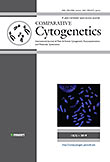
Comparative Cytogenetics
metrics 2024
Unlocking the Secrets of Cytogenetics
Introduction
Comparative Cytogenetics, an esteemed journal published by PENSOFT PUBLISHERS, is a pivotal resource in the fields of animal science, biotechnology, genetics, insect science, and plant science. Since its inception as an Open Access journal in 2009, it has significantly contributed to the democratization of scientific knowledge, allowing researchers and students across the globe to access cutting-edge developments in cytogenetics. With an impressive range of articles published from 2010 to 2024, this journal has achieved a commendable impact within the academic community, earning a Q3 ranking in Animal Science and Zoology, Biotechnology, and Insect Science, as well as a Q4 ranking in Genetics, indicating its growing influence. Its Scopus rankings reflect a solid standing, with notable percentiles showcasing its relevance across diverse biological sciences. Located in Sofia, Bulgaria, Comparative Cytogenetics serves not only to disseminate research but also to foster collaboration in understanding cytogenetic dynamics, making it an essential platform for professionals, researchers, and students alike.
Metrics 2024
 0.30
0.30 1.00
1.00 1.00
1.00 25
25Metrics History
Rank 2024
Scopus
IF (Web Of Science)
JCI (Web Of Science)
Quartile History
Similar Journals
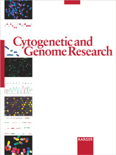
CYTOGENETIC AND GENOME RESEARCH
Advancing the frontiers of cytogenetics and genomics.CYTOGENETIC AND GENOME RESEARCH is a pivotal journal dedicated to the exploration of cytogenetics, genomics, and their applications within clinical genetics and molecular biology. Published by KARGER in Switzerland, this journal aims to foster comprehensive discussions and disseminate impactful research from diverse fields related to genetics. It operates under an open access model, ensuring that researchers, professionals, and students can easily access and contribute to the latest findings. With coverage spanning from 1962 to 2024, CYTOGENETIC AND GENOME RESEARCH continues to serve as a vital resource, despite its current categorization in the Q4 quartile across Genetics and Molecular Biology. It provides an avenue for advancing the understanding of genomic mechanisms and their implications for human health. The journal encourages submissions that delve into cutting-edge methodologies, data interpretation, and theoretical frameworks, thereby playing a crucial role in the advancement of genetic research and its clinical applications.

GENETICA
Illuminating Genetic Discoveries Across DisciplinesGENETICA is a prominent journal published by SPRINGER, dedicated to advancing the field of genetics and its applications across various biological disciplines, including animal science, plant science, and insect science. Since its inception in 1919, the journal has consistently served as a vital platform for researchers and professionals to disseminate high-quality research findings that explore the genetic bases of biological phenomena. With its current scope spanning from 1943 to 2024, GENETICA holds a commendable position in the academic community, as evidenced by its Q2 ranking in both animal science and insect science, and its active contribution to interdisciplinary studies in genetics. Although the journal does not offer open access, it remains accessible through institutional subscriptions and libraries, ensuring its vital research is widely circulated. Researchers, professionals, and students alike will find GENETICA an invaluable resource for the latest discoveries and methodologies in the ever-evolving landscape of genetics.

NUCLEUS-INDIA
Connecting academia and practice through groundbreaking research.NUCLEUS-INDIA is a prominent academic journal that delves into the intricate realms of Cell Biology, Genetics, Molecular Biology, and Molecular Medicine. Published by SPRINGER INDIA, this journal has been a reliable source of innovative research since its inception in 2011. With an ISSN of 0029-568X and an E-ISSN of 0976-7975, NUCLEUS-INDIA stands out in the scientific community, functioning as a critical platform for the dissemination of groundbreaking findings and advancements within its fields of study. Despite being categorized in the lower quartiles as of 2023, it remains an important contributor to the literature, providing insights that influence both academic and practical perspectives in genetics and molecular sciences. Researchers, professionals, and students alike can benefit from its diverse array of articles addressing contemporary challenges and innovations. The journal is located at 7th Floor, Vijaya Building, 17, Barakhamba Road, New Delhi 110 001, India, and aims to enhance the scholarly discourse in biology by publishing works that push the boundaries of current understanding.
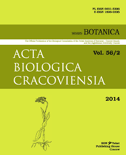
ACTA BIOLOGICA CRACOVIENSIA SERIES BOTANICA
Cultivating knowledge, enriching biodiversity.ACTA BIOLOGICA CRACOVIENSIA SERIES BOTANICA is a distinguished journal published by the Polska Akademia Nauk (Polish Academy of Sciences), with its roots tracing back to 1996. As a pivotal publication in the field of Plant Science, it serves to disseminate high-quality research and findings, contributing to the ongoing development and understanding of biodiversity, plant ecology, and conservation. The journal is indexed under Scopus, ranked #203 out of 516 in its category, placing it in the 60th percentile and firmly within Q3 quartile for Plant Science in 2023. Researchers, professionals, and students will find invaluable content within its pages, enhancing their knowledge and supporting academic exploration. Although it currently does not offer open access options, the journal remains a crucial resource for those engaged in botanical sciences, with a commitment to advancing scholarship in Poland and beyond.

JOURNAL OF MOLECULAR EVOLUTION
Advancing the Frontiers of Molecular UnderstandingThe Journal of Molecular Evolution, published by Springer, is a prestigious peer-reviewed journal dedicated to advancing the understanding of molecular evolution through high-quality research and analysis. With an impact factor establishing it as a leading authority in the field, this journal provides a vital platform for scholars focused on the intricate relationships between molecular biology and evolutionary processes. Featuring a Q1 ranking in Ecology, Evolution, Behavior and Systematics, and significant rankings in Genetics and Molecular Biology, the journal has consistently positioned itself at the forefront of academic discourse since its inception in 1971. Notably, the journal boasts an extensive archive that converges from 1971 to 2024, providing a comprehensive resource for current and future research. Although it operates on a subscription model, the high caliber of contributions ensures that it remains an essential reference point for researchers, professionals, and advanced students eager to deepen their understanding of molecular mechanisms and evolutionary dynamics.

MOLECULAR GENETICS AND GENOMICS
Exploring the Depths of Molecular BiologyMOLECULAR GENETICS AND GENOMICS is a distinguished journal published by SPRINGER HEIDELBERG that serves as a pivotal platform for the communication of cutting-edge research and developments in the fields of genetics, molecular biology, and medicine. With an ISSN of 1617-4615 and an E-ISSN of 1617-4623, this journal has established itself since its inception in 1994 as a significant resource for researchers aiming to explore the complexities of genetic interactions and their implications in various biological systems. The journal is indexed in Scopus, with respectable rankings in the Genetics, Molecular Biology, and Biochemistry categories, showcasing its position within the academic community. It is categorized in the 2023 rankings as Q3 in Genetics, Q2 in Medicine (miscellaneous), and Q3 in Molecular Biology, indicating its relevance and quality in the scientific discourse. The journal also promotes open access, ensuring that researchers and professionals can easily share and advance knowledge in the rapidly evolving disciplines of molecular genetics and genomics. As the journal continues to bridge the gap between experimental and theoretical research, it presents a vital space for innovation, fostering collaborations and scholarly exchange among its readership.
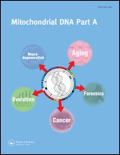
Mitochondrial DNA Part A
Empowering Discoveries in Mitochondrial ResearchMitochondrial DNA Part A, published by Taylor & Francis Ltd, is a distinguished journal dedicated to the exploration of mitochondrial genetics and its implications for health and disease. With an ISSN of 2470-1394 and an E-ISSN of 2470-1408, this journal serves as an open-access platform, promoting the dissemination of high-quality research in the field. Operating from the United Kingdom, it offers a vital resource for researchers and professionals keen to delve into the rapidly evolving landscape of mitochondrial studies. Although currently ranked Q4 in both the Genetics and Molecular Biology categories, the journal continues to be a valuable outlet for emerging findings that could impact our understanding of cellular processes and hereditary conditions. Researchers can access articles and data covering recent advancements from 2016 through 2022, with ongoing contributions expected in 2024. As the field grows, so too does the importance of this journal as a source of knowledge and collaboration for the academic community.
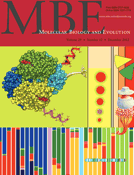
MOLECULAR BIOLOGY AND EVOLUTION
Unraveling Evolution through Molecular InsightsMOLECULAR BIOLOGY AND EVOLUTION, published by Oxford University Press, stands as a premier journal in the fields of molecular biology, evolutionary biology, and genetics. With a proud history dating back to its inception in 1983, the journal spans a convergence period through 2024, providing an exceptional platform for disseminating high-quality research. The journal is recognized in the top Q1 quartile across multiple categories, including Ecology, Evolution, Behavior and Systematics, and Genetics, reflecting its significant impact and relevance in these disciplines. With impressive Scopus rankings—10th in Ecology and Evolution, 12th in Genetics, and 22nd in Molecular Biology—it serves as a vital resource for scholars aiming to stay informed on cutting-edge developments in evolutionary processes and molecular genetics. While it currently does not offer open access, its curated contents resonate well with an audience of researchers, professionals, and students deeply interested in accelerating their understanding of the complexities of life through an evolutionary lens.

CHROMOSOMA
Pioneering Research in Genetics and BeyondCHROMOSOMA is a prestigious journal dedicated to advancing the field of genetics, published by Springer in Germany. With an ISSN of 0009-5915 and an E-ISSN of 1432-0886, this journal has been a cornerstone in the publishing landscape since its inception in 1939, serving as a critical resource for researchers and professionals interested in the intricacies of chromosomal biology. Although it operates on a subscription basis, the journal's rigorous peer-review process ensures the dissemination of high-quality research findings. With a commendable Q2 ranking in both genetic and clinical genetics categories as of 2023, CHROMOSOMA aims to bridge theoretical concepts with practical applications in medicine and biology. Researchers will appreciate its relevance, as indicated by its Scopus ranks and integration of diverse topics ranging from molecular genetics to clinical implications. By fostering collaboration and knowledge-sharing among scholars, CHROMOSOMA continues to shape the future of genetic research.

Comparative Cognition & Behavior Reviews
Driving the dialogue on animal behavior and cognition.Comparative Cognition & Behavior Reviews is a leading open-access journal, published by the Comparative Cognition Society, dedicated to advancing the interdisciplinary field of comparative cognition and behavior. Since its inception in 2006, this journal has become a crucial platform for researchers, professionals, and students alike in the fields of animal science, ecology, and veterinary studies. With an increasing impact on understanding cognitive processes across species, it features diverse articles that explore the evolutionary, ecological, and psychological dimensions of behavior. The journal is particularly notable for its Q3 ranking in Animal Science and Zoology, and Ecology, Evolution, Behavior and Systematics, as well as a Q2 ranking in Veterinary (miscellaneous). Based in Canada, it aims to disseminate high-quality research while allowing free access to its content, fostering a wider dissemination of knowledge. With its continuous growth and commitment to excellence, Comparative Cognition & Behavior Reviews is poised to play an increasingly vital role in shaping the future discourse on cognition and behavior in the animal kingdom.